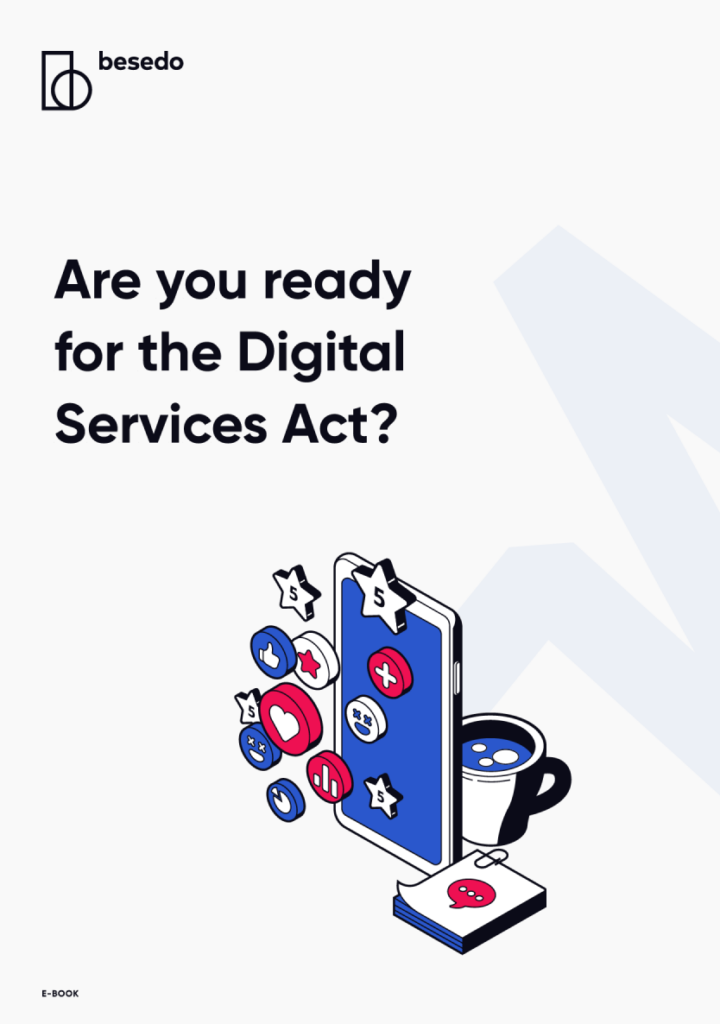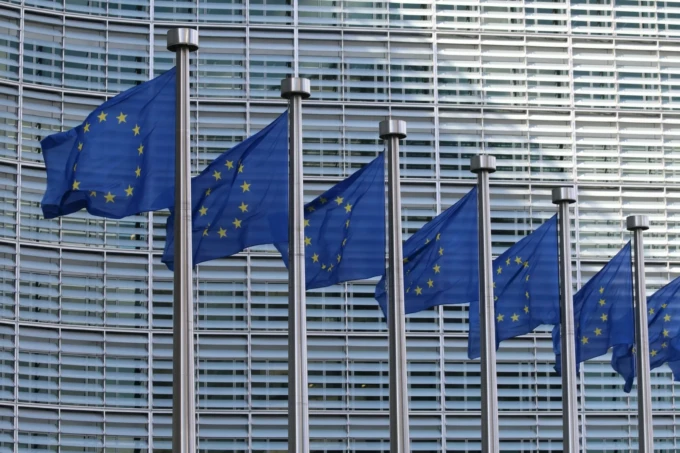Contents
TLDR; The Digital Services Act (DSA) is a new law designed to improve and secure the online world. It requires companies that offer digital services to be more transparent about the rules they use to moderate content on their platforms.

Introduction: What is the Digital Services Act (DSA), and why has it been introduced?
Suppose you’re running an online business – regardless of its size – in the EU or serving customers in the EU. In that case, you’ll want to pay attention to the Digital Services Act (DSA).
One more time for the folks in the back: If you’re in the EU or serving customers in the EU.
This proposed legislation will impact your business by increasing your liability for illegal or harmful content posted by your users. It will require greater transparency and accountability and create a more level playing field for online platforms.
Free eBook: Everything you need to know about the Digital Services Act
First, if we can be so bold as to promote something of our own, our free downloadable ebook has got you covered if you’re looking for a comprehensive resource on the Digital Services Act. Our expert authors have conducted extensive research to bring you valuable insights into the DSA’s impact on digital businesses. With data-backed analysis and actionable strategies, this ebook is the ultimate guide for companies looking to stay ahead of the curve.
We delve into topics such as where digital businesses stand on the DSA, other companies’ concerns, and what measures businesses are taking to prepare. Don’t miss out on this valuable resource for navigating the complex landscape of digital legislation.

Are you ready for the Digital Services Act?
This eBook gives insights into where digital businesses stand on the Digital Services Act (DSA). And what are other businesses doing to prepare for the DSA.
Free eBook →Which online platforms are affected by the DSA?
- Online marketplaces: Consider e-commerce platforms like Amazon, eBay, and other online marketplaces, allowing users to buy and sell goods and services. These platforms are increasingly popular for small and medium-sized businesses, which may use them to reach a wider audience and sell products online.
- Social media platforms: Social networks like Facebook and Twitter, messaging apps like WhatsApp and Signal, and other platforms that allow users to share content and interact with others online. Social media platforms have become a key part of our daily lives. They are often used for a wide range of activities, including communication, entertainment, and news consumption.
- Search engines: This is pretty straightforward because it includes platforms that provide search functionality, such as Google and Bing.
- Internet service providers: This includes companies that provide internet access to users, such as Comcast, Verizon, and BT. Internet service providers are critical in enabling users to access online services and content. They are often subject to regulation around net neutrality and data privacy issues.
- Cloud computing services: Now it’s getting kind of complicated. Cloud computing services have become increasingly popular in recent years due to their ability to provide flexible, scalable, and cost-effective solutions for storing and accessing data and applications. Which cloud computing services are we talking about?
- Infrastructure as a Service (IaaS): IaaS providers, such as Amazon Web Services (AWS), Microsoft Azure, and Google Cloud Platform, offer virtualized computing resources, such as servers, storage, and networking, that can be accessed remotely over the internet.
- Platform as a Service (PaaS): PaaS providers, such as Salesforce and Heroku, offer a platform for developing, testing, and deploying software applications, as well as associated tools and services.
- Software as a Service (SaaS): SaaS providers, such as Dropbox, GitHub, and Slack, offer software applications hosted in the cloud and accessed over the internet. These are just too many to mention here, but unless you’ve been under a rock for the last 15 years, you probably know what types of services we mean.
Update August 28, 2023: The EU defines online platforms and search engines as “very large” if they have more than 45 million monthly users within the EU. To date, 19 such platforms and search engines have been identified by the EU, which include the following:
- Alibaba
- AliExpress
- Amazon Store
- Apple App Store
- Bing
- Booking.com
- Google Maps
- Google Search
- Google Shopping
- Snapchat
- TikTok
- Wikipedia
- YouTube
- Zalando
How does the DSA protect user data and personal information?
Hold up. First of all, it’s important to remember that the DSA itself doesn’t directly give users control over their data and personal information. Still, it creates a legal framework that requires digital service providers to provide users with tools and options to manage their data.
For example, the DSA requires digital service providers to provide users with clear and easy-to-understand information about their data collection and use practices and give them the ability to opt out of certain data collection. This means users will have more control over their data and personal information.
Transparency and accountability
DSA requires digital service providers to be transparent about their data collection and use practices. They must provide clear and easy-to-understand information about what data they collect, why they collect it, and how they use it. They must also be accountable for handling users’ data and must take steps to protect users’ privacy.
User control
DSA empowers users to control their data. Digital service providers must provide users with tools to manage their data, such as options to delete or export it, allowing them to opt out of particular data collection and use practices.
Some hands-on examples
While it’s all good to have ideas and strategies, there are also some low-hanging fruits you can start implementing and pushing out today. Start the discussion with your developers, product managers, and designers today and plan ahead.
- A social media platform can provide users with clear information about how their data is collected and used and offer options to manage and delete their data. For example, they can provide a “Download your data” option that allows users to export their data easily.
- An online marketplace can obtain unambiguous consent from users before collecting and processing their data. For example, they can ask users to agree to the terms and conditions before they can create an account or make a purchase.
- An internet service provider can implement security measures to protect user data. For example, they can require two-factor authentication to access user accounts and encrypt all data in transit and at rest.

Prohibition of certain practices
Yes, this might sound like the prohibition of witchcraft. However, the DSA prohibits certain practices that may harm users’ data privacy, such as using dark patterns to manipulate users into consenting to data collection and processing.
What are these dark patterns you speak of?
Dark patterns are sneaky design tricks that digital service providers use to influence your behavior and get you to do things you might not want to do. They’re called “dark” because they often exploit cognitive biases and psychological vulnerabilities to trick users.
For example, have you ever tried to cancel a subscription but found it really hard to do so? That’s because some digital service providers use dark patterns to make it difficult for users to find the cancellation button, or they might use confusing language to deter users from canceling.
You know, when you have to google “how to cancel my [service] account” – that’s not a great sign.
Another example of a dark pattern is when a website or app asks you to sign up for a service and automatically opts you in to receive marketing emails or other communications. Keep that checkbox clear and in sight, and make it super-easy to unsubscribe.
Dark patterns are incredibly annoying because they can be deceptive and prevent them from making informed decisions. This is why the Digital Services Act aims to prohibit the use of dark patterns to protect users’ rights and interests.
No more witchcraft.
Enhanced oversight
DSA establishes a regulatory framework to ensure digital service providers comply with the rules and take appropriate measures to safeguard users’ data and privacy. This framework includes new powers for national authorities to enforce the laws and sanctions for non-compliance.
However, it’s important to note that the DSA is a proposed law, and its effectiveness in protecting user data and privacy will depend on how it’s implemented and enforced.
What is happening now regarding the DSA?
Since its implementation in 2018, it’s been helping to ensure that companies protect their customers’ data and personal information. Now, though, it’s been expanded with even higher security standards—encryption, two-factor authentication, regular monitoring, and more must be done before businesses can show they are compliant with the DSA.
Plus, any changes to policies or procedures regarding data protection must also be communicated clearly, so customers stay informed. In this age of cybercrime threats becoming ever more complex and sophisticated, these extra steps have become essential for keeping your customers safe.
As a business owner, it is paramount to stay up-to-date with the latest developments related to the DSA. So what should you be focusing on?
- Understand the scope and requirements of the DSA: The DSA is expected to apply to a wide range of digital services, including online marketplaces, social media platforms, and search engines. Please familiarize yourself with the specific requirements for your business under the legislation.
- Be prepared to comply with new transparency and accountability requirements: The DSA is expected to introduce new requirements related to transparency and accountability, including rules related to content moderation, data sharing, and takedown procedures. You may want to begin thinking about how your business can adapt to these requirements.
- Prepare for potential enforcement actions: The DSA is expected to provide national authorities with new enforcement powers to address non-compliance with the legislation. You should ensure your business has processes to respond to potential enforcement actions, such as investigations and fines.
- Keep up-to-date with the latest developments: The DSA is still being developed and is subject to change. You should follow updates from the European Commission and other relevant authorities to ensure you are aware of any changes to the legislation.
How content moderation can help
All this can seem very daunting, no matter who you are. As the Digital Services Act comes into effect, companies offering digital services must be more transparent about their content moderation practices and take action against illegal or harmful content posted on their platform.
Hi, we are Besedo. Nice to meet you 👋
By continuously monitoring your platform for illegal or harmful content, a content moderation service can identify and remove such content quickly.
Partnering with a content moderation service can help your business comply with DSA regulations and provide users with a safer and more trustworthy online experience.
One key benefit of partnering with a content moderation service is that it can help your business comply with DSA content moderation requirements. By providing expert guidance and support on DSA compliance and content moderation best practices, a content moderation service can help your business meet evolving regulatory requirements.
Another benefit of partnering with a content moderation service is that it can provide enhanced transparency and accountability for your business. A content moderation service can help increase user trust and satisfaction by providing clear and easy-to-understand information about content moderation practices.
Proactive monitoring and reporting is another way a content moderation service can help your business. A content moderation service can quickly identify and remove such content by continuously monitoring your platform for illegal or harmful content. This can help reduce potential liability and reputational damage for your business.
In addition to compliance support, enhanced transparency and accountability, and proactive monitoring and reporting, a content moderation service can provide expert guidance on emerging content moderation best practices. This can help your business stay ahead of the curve and proactively address emerging regulatory requirements.
Phew! It’s a lot to take in, we know.
A content moderation service can help your business prepare for and comply with evolving regulatory requirements by providing expert guidance, enhanced transparency and accountability, and proactive monitoring and reporting.
DSA does not only apply to very large online platforms (VLOP)
The law is intended to apply to various digital services regardless of size. While the exact scope of the DSA is still being defined, it is clear that the legislation is not intended to apply only to very large platforms.
The DSA is likely to introduce a tiered approach to regulation, with different requirements and obligations for different types of digital services. However, even smaller platforms and marketplaces will likely be subject to some requirements under the DSA.
Summary and key takeaways
Okay, even though we started with a TLDR, we can summarize this quickly. The Digital Services Act (DSA) is a new law designed to improve the online world and make everyone safer.
This law requires digital service providers to be more transparent about their data collection and use practices and be accountable for handling users’ data to protect their privacy. The DSA prohibits certain practices that may harm users’ data privacy, such as using dark patterns to manipulate users into consenting to data collection and processing.
Witchcraft, remember?
The law is expected to apply to a wide range of digital services, including online marketplaces, social media platforms, and search engines — regardless of size.
Oh, and keep this in mind: Businesses operating in the EU or serving customers in the EU should prepare to comply with the new requirements and obligations introduced by the DSA.
So stay up-to-date with the latest developments related to the DSA and understand the scope and requirements of the law, be prepared to comply with new transparency and accountability requirements, and be ready for potential enforcement actions.
If you need someone to talk to about this, we’re always available for a quick chat—no strings attached.
Ahem… tap, tap… is this thing on? 🎙️
We’re Besedo and we provide content moderation tools and services to companies all over the world. Often behind the scenes.
Want to learn more? Check out our homepage and use cases.
And above all, don’t hesitate to contact us if you have questions or want a demo.


